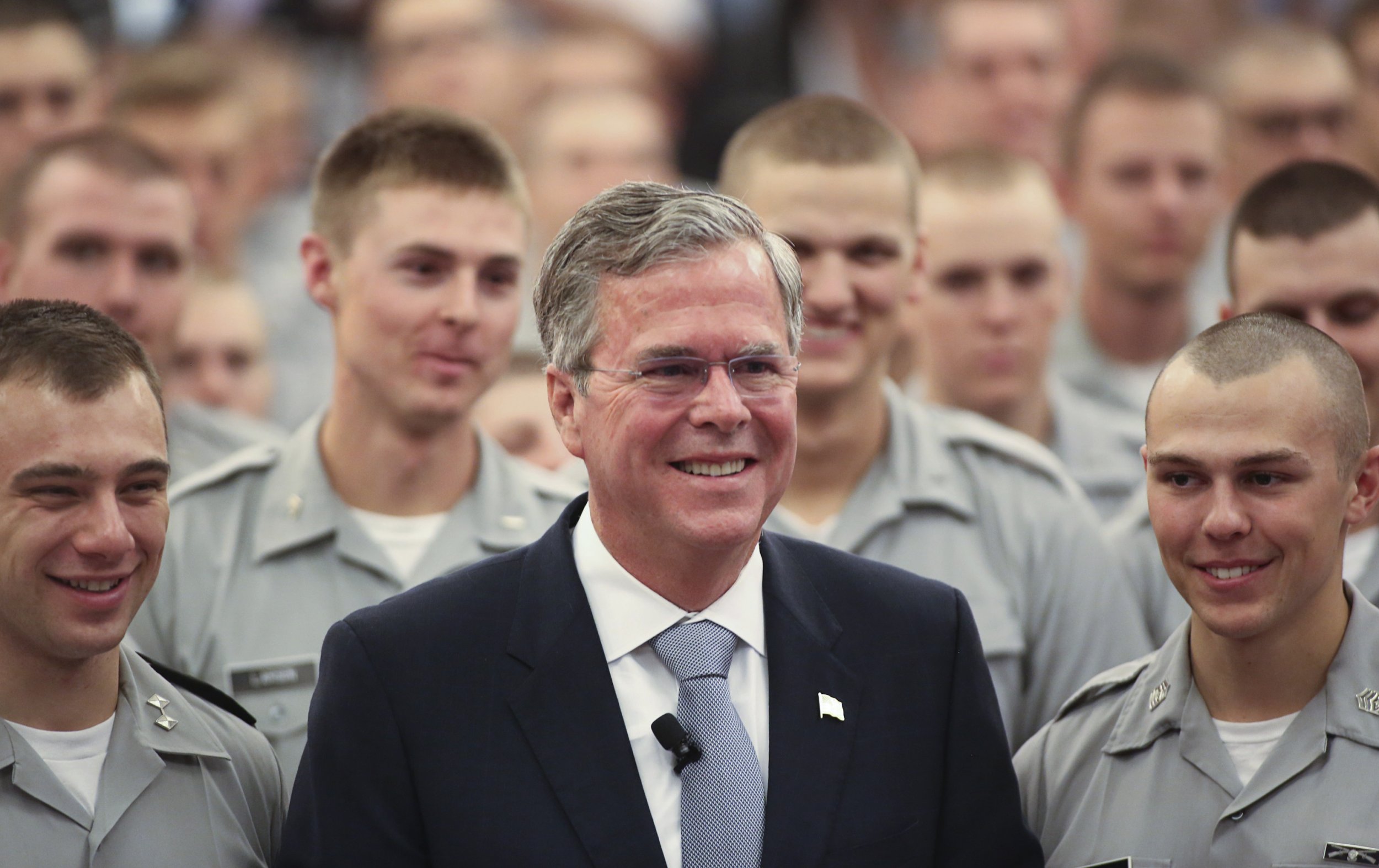
Jeb Bush has a problem. In addition to his low poll numbers, the former Florida governor just doesn't seem to be able to convince Americans that he would be a better commander in chief than his rivals in the Republican presidential field.
After the attacks on Paris, Bush began to ramp up his criticisms of the Obama administration's approach to Syria.
"A strategy would be how do we mobilize support for the remnants of the Syrian Free Army, and it might require combat troops to inspire an international effort," Bush said during a recent interview. "I would let the military commanders give the commander in chief options rather than tell them what you want to hear"—a reference to overly optimistic intelligence that Barack Obama seems to have heard as the Islamic State militant group (ISIS) has surged.
"A more expanded role for the special operators would be essential," Bush added. "And being more effective in strikes as it relates to the air."
The problem for Bush and his fellow GOP candidates is that most of their suggestions have been tried, to a greater or lesser extent, during Obama's tenure.
The administration, albeit after considerable delay, has put significant effort into arming indigenous ground forces, including the Syrian Free Army. When she was secretary of state, Hillary Clinton strongly urged Obama to arm Sunnis friendly to U.S. interests.
But with a war on two fronts, the various militias resisting Bashar al-Assad's regime and ISIS have been spread thin. The "train and equip" program intended to arm Syrian rebels for the fight against ISIS was an acknowledged failure, and the Pentagon has since shifted its strategy to providing more arms to local fighters already on the front lines.
Now there are even some "boots on the ground." The administration recently sent 50 American special operations troops into Syria month for an advise-and-support mission (the "special operators" Bush was referring to). The U.S. is already leading an airstrike campaign and has pledged to ramp up its attacks with French assistance.
At times, the criticisms of U.S. policy have been dubious. Speaking to MSNBC two days after the Paris attacks, Bush said the U.S. should formally declare war on ISIS. That might sound strong, but in practice presidents already have a congressional authorization to use force at will against terrorists, and Obama administration officials, including Secretary of Defense Ashton Carter, have repeatedly said we're at war with the militant group.
It's not as though Obama hasn't sought a declaration of war before. In 2013, he asked Congress to authorize an attack on the Assad regime, but lawmakers, including GOP presidential candidates Marco Rubio and Rand Paul, voted down the authorization. Obama went on to get criticism from John McCain and Lindsey Graham for letting the Syrian population suffer. During the tense buildup to his decision on launching a full-scale attack, it was military advisers (that is, advisers from the military, not hawkish civilians) who pressured Obama to act carefully and suggested that large numbers of troops would be necessary to fight Assad's forces.
When the TV is off, the candidates face a simple fact. The Obama administration is following most or all of the interventionist policies that the U.S. has used throughout modern history, with the exception of establishing a no-fly zone. The other exception? Invading. Increasing the number of special operations troops deployed to the region seems like a way to fight a war without really getting involved, but having too few troops could also put lives at risk without tilting the balance. During the run-up to the war in Iraq, the Bush administration underestimated the number of troops that would be needed to pacify the region after deposing Saddam Hussein.
The same problems would accompany proposed "safe zones," territories set up to protect civilians and militias.
Carly Fiorina has accused Obama of presenting the public with "a false choice" between all-out war and the current approach, but the major component of the third choice she offers is a no-fly zone. Since ISIS doesn't have an air force, such a strategy would be of limited effectiveness in terms of counterterrorism, though it might affect Assad. Proponents think it would send a message to Russian President Vladimir Putin, who has deployed Russian jets to strike within Syria.
Bush's statements, and parallel suggestions made by other Republicans, are not actually a far cry from the policy advocated by Clinton, who gave a major address last week on the war against ISIS. Clinton suggested a no-fly zone, safe zones and increased direct arms shipments to local militias. Bush, Chris Christie, Marco Rubio, John Kasich and Ted Cruz have all made similar suggestions in the Republican presidential debates.
Even Ben Carson, the least experienced candidate in both parties, isn't so far off from the current Democratic administration. During the Fox Business Network Republican debate, he said that the U.S. should make ISIS "look like losers" by "destroying their caliphate." That's almost exactly the same thing as saying what Obama did: "degrade and destroy." Obama and Carson would disagree about the timetable; the former neurosurgeon thinks destroying ISIS would be "easy," but the current president has said this view betrays Carson's ignorance of the region.
Unlike the Republicans, Clinton has characterized her proposals as an acceleration and expansion of Obama's policies, not a reversal of the president's inaction.
That's not to downplay some significant differences between the candidates. Republicans and Democrats disagree over whether the U.S. is at war with "radical Islam," which has far-reaching consequences diplomatically. Clinton and her opponents vehemently disagree about negotiating with certain regimes and about the Iran nuclear agreement. Also, Republicans have a very different take on allowing Syrian refugees into the U.S.
Unless a true war breaks out with U.S. involvement, the debate will continue to be mostly about rhetoric, not policy. So far, the only mainstream GOP candidate to suggest a ground war has been Graham, the senator from South Carolina. He has explicitly pledged to send 10,000 ground troops into Syria, a promise other candidates have not been prepared to make.
The Obama administration has opened itself up to criticism, with its shifting "red line" rhetoric about the Syrian government's use of chemical weapons and Obama's embarrassing reference to ISIS as the "the jayvee team." Republicans have fertile soil in which to plant the idea that the administration has mishandled this insurgency. But with U.S. policy in full view, there's less disagreement than the debates would suggest.
Uncommon Knowledge
Newsweek is committed to challenging conventional wisdom and finding connections in the search for common ground.
Newsweek is committed to challenging conventional wisdom and finding connections in the search for common ground.
About the writer
Jack Martinez is a writer from Great Falls, Montana. He attended Stanford University, where he studied the Classics and received ... Read more
To read how Newsweek uses AI as a newsroom tool, Click here.





